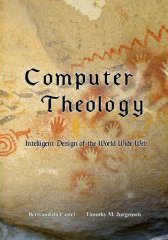PRESS
COMPUTER THEOLOGY |
||||
|
States Code. The
Code of Federal Regulations is a compendium of rules and regulations issued by
the various administrative agencies of the federal government. The consequences
of interactions take rather distinct but general forms within each of the three
mentioned domains. Criminal conduct, that is interactions that effect results
counter to criminal prohibitions, generally elicit physical sanctions of some
form; either fines, a period of incarceration, periods of formal and informal
scrutiny of activities or all of the above; that is, sometimes, the
consequences might include a combination of all three domains. Interactions
under civil law usually take the form of contracts in various guises. Contract
law typically requires a specification of consequences within any agreement if
that agreement is to be enforceable through further legal action. The
consequences of contracts are usually referred to as consideration, and
to guarantee that a contract, for example between two parties, is enforceable under
most law, it is necessary for both parties to receive consideration under the
terms of the contract. “I’ll scratch your back if you scratch mine.” An offer
to provide something or to perform some act without provision for receiving
consideration in return for it is typically referred to as a gratuitous promise
and it may not be enforceable through the legal system. Consideration can take
a number of forms: perhaps payment, perhaps a specific service or perhaps a
promise to act in a certain way. Both criminal and civil sanctions tend to be
backward looking. That is, they are applied after the fact of a transaction,
when some party contests the validity of the transaction under the applicable
rules. The consequences
of administrative interactions, however, tend to be forward looking. That is,
rules and regulations will often require a specific set of actions, perhaps
including some type of certification, prior to any governed interactions. A
regulation established by the Federal Aviation Agency requires a pilot
certification and periodic, acceptable physical examinations before a person is
allowed to fly a commercial airliner. A prospective pilot is required to prove
adherence to these rules before being allowed to take control of a plane.
Failure to demonstrate that these requirements have been fulfilled are
sufficient grounds for administrative or police officials to physically
prohibit a potential pilot from entering the cockpit of a plane. Religion
Religion is a central theme of this book, and we have now finally reached a point of sufficient background to expand upon our concept of religions as instances of social ecosystems; right here in the middle of a chapter; just about in the middle of the book for that matter. Our reasoning has been that religion is a natural result of the evolution of the human species. It is particularly associated with modern man, the term often used to describe the members of the species that have emerged since the last recognizable mutation event of extreme consequences occurred somewhere between 50,000 and more than 100,000 years ago. At the present time, no one is completely sure what the physiological manifestation of this event was, but since it occurred, there has been a steady progression of human development, culminating in the current situation in which Homo sapiens sapiens is capable, both intentionally and unintentionally, of overwhelming the physical world to the extent of making it uninhabitable for the human species. Or course, one might readily speculate that, at the point where we collectively proceed over the precipice, the physical world will continue on and some other species will get its shot at the golden ring. But, we’ll leave that value judgment, as best we can, for others to consider. Let us, instead, make an attempt to reconcile religion with human physiological characteristics such that we arrive at the current culmination of social ecosystems. |
||||
|
||||
© Midori Press, LLC, 2008. All rights reserved for all countries. (Inquiries) The contents of ComputerTheology: Intelligent Design of the World Wide Web are presented for the sole purpose of on-line reading to allow the reader to determine whether to purchase the book. Reproduction and other derivative works are expressly forbidden without the written consent of Midori Press. Legal deposit with the US Library of Congress 1-33735636, 2007.
|
ComputerTheology Intelligent Design of the World Wide Web Bertrand du Castel and Timothy M. Jurgensen Midori Press, Austin Texas 1st Edition 2008 (468 pp) ISBN 0-9801821-1-5 |
Book available at Midori Press (regular) |
